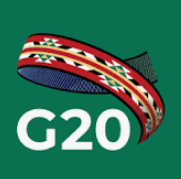Payments by 58 least developed countries (LDCs) and Small Island Developing States (SIDS) reached $21 billion in 2022 – up from $14 billion in 2021 and $13bn in 2020.
But despite the huge sums countries in the global South have spent on interest and capital repayments to the richest nations, G20 countries still held a total of $155 billion of bilateral LDC and SIDS debt in 2021.
The burden of debt on poorer countries has increased due to the global economic slowdown stemming from Russia’s invasion of Ukraine, COVID-19 and global price and interest rate rises. This has put many poor countries in increasingly critical positions, while forcing some to default and pushing others to the brink.
IIED’s analysis is based on the latest available data from the World Bank and comes as G20 finance ministers and central bank governors prepare to meet in Gandhinagar, India. IIED is calling on the G20 to create a financial system that is fairer to people on the front line of climate change.
But despite the huge sums countries in the global South have spent on interest and capital repayments to the richest nations, G20 countries still held a total of $155 billion of bilateral LDC and SIDS debt in 2021.
The burden of debt on poorer countries has increased due to the global economic slowdown stemming from Russia’s invasion of Ukraine, COVID-19 and global price and interest rate rises. This has put many poor countries in increasingly critical positions, while forcing some to default and pushing others to the brink.
IIED’s analysis is based on the latest available data from the World Bank and comes as G20 finance ministers and central bank governors prepare to meet in Gandhinagar, India. IIED is calling on the G20 to create a financial system that is fairer to people on the front line of climate change.
Dr Tom Mitchell, IIED’s executive director, said: “The huge debt burdens on some of the countries most at risk from climate change means they are forever paying back interest to much wealthier nations who have done the most to cause the climate crisis. This is an injustice.
“Money that could be spent protecting people’s homes from floods or ensuring their access to water during drought, as well as running schools and hospitals, is instead filling the coffers of big banks and polluters.
“The G20 must build on the political goodwill established at last month’s Paris finance summit to overhaul our broken international system, which is still based on a legacy of colonisation and 1940s thinking.”
The G20 need to make greater use of debt swaps for climate and nature, parametric insurance, pause clauses or even cancellation to allow vulnerable nations to escape what is currently an impossible situation. Any new loans should have more concessional terms or even be replaced by grants, but in all cases restructuring should involve tailored solutions for each individual country.
Data also shows that G20 countries hold billions more debt through multilateral institutions, like the World Bank and European Development Fund, in addition to their bilateral deals. Though the available data is patchy, IIED found that 19 such organisations in which the G20 are stakeholders held a further $131 billion of LDC and SIDS debt in 2021.
Because comprehensive data is not available the overall totals will actually be higher than this. And these figures do not include the debt holdings of private creditors based in G20 countries, like banks.
The LDCs and SIDS have done the least to cause the climate crisis but are among the most at risk from global heating and disasters, like cyclones and droughts, that it can generate. Every dollar they spend on debt servicing is one that could go to shoring up their climate vulnerabilities.
By contrast the G20 includes the largest current and historical emitters of greenhouse gases, many of which built their economic power through conquest and colonisation.
While debt financing is not a bad thing per se, creditors have often provided it on terms that are unfavourable to lower-income nations, or with strings attached.
 |
IIED revealed last month how LDCs and SIDS are spending billions more to pay down their debts than they are receiving in grants and loans to fight climate change. This situation will only continue if the G20 fails to instigate real change.
Chuks Egbune/Editor


No comments:
Post a Comment